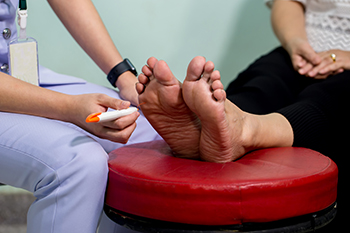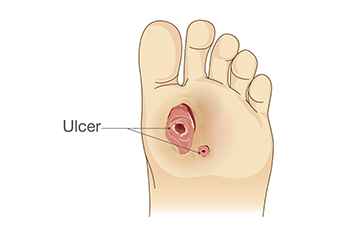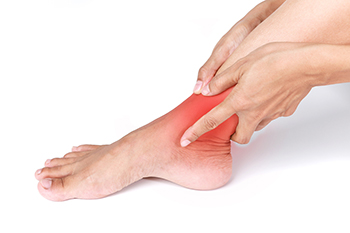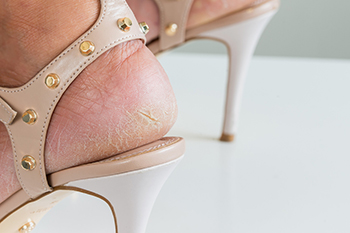Items filtered by date: July 2024
Peripheral Neuropathy Affects the Feet

Peripheral neuropathy, which arises from damaged or diseased peripheral nerves, significantly impacts the feet by disrupting the transmission of signals from the brain. Symptoms of peripheral neuropathy can include numbness, tingling, sharp pain, and muscle weakness in the feet. Such symptoms can make everyday activities challenging, and may cause balance issues or foot injuries that are unnoticed due to loss of sensation. The underlying causes of peripheral neuropathy are diverse, with diabetes being a prevalent factor. An early diagnosis and treatment of peripheral neuropathy is vital to manage symptoms and prevent further nerve damage. A podiatrist can perform a thorough exam and order diagnostic tests to develop a comprehensive treatment plan for you. This may include medication or lifestyle modifications to alleviate discomfort and improve mobility. If you have peripheral neuropathy that affects your feet, it is suggested that you schedule an appointment with a podiatrist for an exam and treatment.
Neuropathy
Neuropathy can be a potentially serious condition, especially if it is left undiagnosed. If you have any concerns that you may be experiencing nerve loss in your feet, consult with one of our podiatrists from Pocono Foot & Ankle Consultants. our doctors will assess your condition and provide you with quality foot and ankle treatment for neuropathy.
What Is Neuropathy?
Neuropathy is a condition that leads to damage to the nerves in the body. Peripheral neuropathy, or neuropathy that affects your peripheral nervous system, usually occurs in the feet. Neuropathy can be triggered by a number of different causes. Such causes include diabetes, infections, cancers, disorders, and toxic substances.
Symptoms of Neuropathy Include:
- Numbness
- Sensation loss
- Prickling and tingling sensations
- Throbbing, freezing, burning pains
- Muscle weakness
Those with diabetes are at serious risk due to being unable to feel an ulcer on their feet. Diabetics usually also suffer from poor blood circulation. This can lead to the wound not healing, infections occurring, and the limb may have to be amputated.
Treatment
To treat neuropathy in the foot, podiatrists will first diagnose the cause of the neuropathy. Figuring out the underlying cause of the neuropathy will allow the podiatrist to prescribe the best treatment, whether it be caused by diabetes, toxic substance exposure, infection, etc. If the nerve has not died, then it’s possible that sensation may be able to return to the foot.
Pain medication may be issued for pain. Electrical nerve stimulation can be used to stimulate nerves. If the neuropathy is caused from pressure on the nerves, then surgery may be necessary.
If you have any questions, please feel free to contact our offices located in Stroudsburg, Nazareth, and Easton, PA . We offer the newest diagnostic and treatment technologies for all your foot care needs.
Managing Diabetic Foot Ulcers
 Diabetic foot wounds are a significant concern for individuals managing diabetes, with up to a third of patients developing foot problems during their lifetime. Early signs include dry skin and calluses, which can progress to poorly healing ulcers on the feet or toes. These complications arise from nerve and blood vessel damage that results from high blood sugar levels over a long period. Factors like wearing tight shoes, foot deformities, and thick calluses can increase the risk. This damage reduces the foot's sensitivity to pressure and injuries, leading to unnoticed and untreated wounds that are slow to heal. Preventive measures, such as proper foot care, wearing well-fitting shoes, and avoiding injuries, are essential in reducing the risk of diabetic ulcers. Regular visits to a podiatrist play an essential role in the early detection and management of diabetic foot problems. Podiatrists can provide comprehensive care, including examining the skin, assessing blood flow, and testing nerve sensitivity, which may prevent minor issues from developing into severe complications. If you are suffering from diabetic foot complications, it is suggested that you schedule an appointment with a podiatrist for an exam, diagnosis, and treatment options.
Diabetic foot wounds are a significant concern for individuals managing diabetes, with up to a third of patients developing foot problems during their lifetime. Early signs include dry skin and calluses, which can progress to poorly healing ulcers on the feet or toes. These complications arise from nerve and blood vessel damage that results from high blood sugar levels over a long period. Factors like wearing tight shoes, foot deformities, and thick calluses can increase the risk. This damage reduces the foot's sensitivity to pressure and injuries, leading to unnoticed and untreated wounds that are slow to heal. Preventive measures, such as proper foot care, wearing well-fitting shoes, and avoiding injuries, are essential in reducing the risk of diabetic ulcers. Regular visits to a podiatrist play an essential role in the early detection and management of diabetic foot problems. Podiatrists can provide comprehensive care, including examining the skin, assessing blood flow, and testing nerve sensitivity, which may prevent minor issues from developing into severe complications. If you are suffering from diabetic foot complications, it is suggested that you schedule an appointment with a podiatrist for an exam, diagnosis, and treatment options.
Diabetic foot care is important in preventing foot ailments such as ulcers. If you are suffering from diabetes or have any other concerns about your feet, contact one of our podiatrists from Pocono Foot & Ankle Consultants. our doctors can provide the care you need to keep you pain-free and on your feet.
Diabetic Foot Care
Diabetes affects millions of people every year. The condition can damage blood vessels in many parts of the body, especially the feet. Because of this, taking care of your feet is essential if you have diabetes, and having a podiatrist help monitor your foot health is highly recommended.
The Importance of Caring for Your Feet
- Routinely inspect your feet for bruises or sores.
- Wear socks that fit your feet comfortably.
- Wear comfortable shoes that provide adequate support.
Patients with diabetes should have their doctor monitor their blood levels, as blood sugar levels play such a huge role in diabetic care. Monitoring these levels on a regular basis is highly advised.
It is always best to inform your healthcare professional of any concerns you may have regarding your feet, especially for diabetic patients. Early treatment and routine foot examinations are keys to maintaining proper health, especially because severe complications can arise if proper treatment is not applied.
If you have any questions please feel free to contact our offices located in Stroudsburg, Nazareth, and Easton, PA . We offer the newest diagnostic and treatment technologies for all your foot and ankle needs.
Effective Strategies for Preventing Running Injuries

Preventing running injuries involves a combination of proper techniques, consistent training, and adequate recovery. It is essential to wear well-fitted shoes that provide ample support and cushioning to reduce impact stress on your joints. Gradually increasing your mileage and intensity allows your body to adapt and strengthen muscles, tendons, and ligaments over time. Incorporating a comprehensive warm-up routine before running prepares your muscles for the exertion ahead and can help prevent strains. Strength training and flexibility exercises are vital as they enhance muscle balance and joint stability. Listening to your body and taking rest days when needed can prevent overuse injuries, ensuring long-term sustainability in your running routine. Hydration and proper nutrition also play vital roles in maintaining muscle function and recovery. If you have sustained a foot or ankle injury while running, it is suggested that you visit a podiatrist who can treat foot conditions while guiding you toward effective running injury prevention techniques.
Exercising your feet regularly with the proper foot wear is a great way to prevent injuries. If you have any concerns about your feet, contact one of our podiatrists of Pocono Foot & Ankle Consultants. our doctors will treat your foot and ankle needs.
How to Prevent Running Injuries
Many common running injuries are caused by overuse and overtraining. When the back of the kneecap starts wearing out and starts causing pain in your knee, this is commonly referred to as runner’s knee. Runner’s knee is a decrease in strength in your quadriceps and can occur if you’re not wearing properly fitted or supporting shoes. To prevent runner’s knee, focusing on hip strengthening is a good idea, as well as strengthening your quads to keep the kneecaps aligned.
What Are Some Causes of Running Injuries?
- One cause of a common running injury is called iliotibial band syndrome.
- Plantar fasciitis is also another common injury.
- Stress fractures can occur from overtraining, lack of calcium, or even your running style.
Best Ways to Prevent Running Injuries
- Wear footwear that fits properly and suits your running needs.
- Running shoes are the only protective gear that runners have to safeguard them from injury.
- Make a training schedule. Adding strengthening exercises as well as regular stretching can help keep you strong and limber and can lessen the possibility of injuries.
- Stretching keeps muscles limber; this will help you gain better flexibility.
If you have any questions please feel free to contact our offices located in Stroudsburg, Nazareth, and Easton, PA . We offer the newest diagnostic and treatment technologies for all your foot and ankle needs.
Symptoms of a Sprained Ankle
 A sprained ankle occurs when the ligaments that support the ankle stretch or tear due to sudden twisting, rolling, or turning of the foot. This injury is common in sports, walking on uneven surfaces, or missteps that put the ankle in an awkward position. Symptoms of a sprained ankle can include pain, swelling, bruising, and difficulty bearing weight on the affected foot. You might also hear a popping sound at the time of the injury. To determine if you have a sprain, pay attention to the severity of pain and swelling, any instability in the ankle, and whether the pain worsens with movement. Initial treatment for a sprained ankle involves rest, compression, and elevation. Avoid putting weight on the ankle and consider using crutches. Anti-inflammatory pain relievers can help manage pain and discomfort. Proper rehabilitation, including targeted stretching exercises, is essential for healing and preventing future injuries. If you think you have sprained your ankle, it is suggested that you schedule an appointment with a podiatrist for an accurate diagnosis and comprehensive treatment plan.
A sprained ankle occurs when the ligaments that support the ankle stretch or tear due to sudden twisting, rolling, or turning of the foot. This injury is common in sports, walking on uneven surfaces, or missteps that put the ankle in an awkward position. Symptoms of a sprained ankle can include pain, swelling, bruising, and difficulty bearing weight on the affected foot. You might also hear a popping sound at the time of the injury. To determine if you have a sprain, pay attention to the severity of pain and swelling, any instability in the ankle, and whether the pain worsens with movement. Initial treatment for a sprained ankle involves rest, compression, and elevation. Avoid putting weight on the ankle and consider using crutches. Anti-inflammatory pain relievers can help manage pain and discomfort. Proper rehabilitation, including targeted stretching exercises, is essential for healing and preventing future injuries. If you think you have sprained your ankle, it is suggested that you schedule an appointment with a podiatrist for an accurate diagnosis and comprehensive treatment plan.
Ankle and foot injuries are common among athletes and in many sports. They can be caused by several problems and may be potentially serious. If you are feeling pain or think you were injured in a sporting event or when exercising, consult with one of our podiatrists from Pocono Foot & Ankle Consultants. our doctors will assess your condition and provide you with quality foot and ankle treatment.
Common Injuries
The most common injuries that occur in sporting activities include:
- Achilles Tendonitis
- Achilles Tendon Rupture
- Ankle Sprains
- Broken Foot
- Plantar Fasciitis
- Stress Fractures
- Turf Toe
Symptoms
Symptoms vary depending upon the injury and in some cases, there may be no symptoms at all. However, in most cases, some form of symptom is experienced. Pain, aching, burning, bruising, tenderness, tightness or stiffness, sensation loss, difficulty moving, and swelling are the most common symptoms.
Treatment
Just as symptoms vary depending upon the injury, so do treatment options. A common treatment method is known as the RICE method. This method involves rest, applying ice, compression and elevating the afflicted foot or ankle. If the injury appears to be more serious, surgery might be required, such as arthroscopic or reconstructive surgery. Lastly, rehabilitation or therapy might be needed to gain full functionality in the afflicted area. Any discomfort experienced by an athlete must be evaluated by a licensed, reputable medical professional.
If you have any questions, please feel free to contact our offices located in Stroudsburg, Nazareth, and Easton, PA . We offer the newest diagnostic and treatment technologies for all your foot care needs.
Connection Between Thyroid Disorders and Cracked Heels

Cracked heels can often be more than just a cosmetic issue. They may signal an underlying health condition, such as a thyroid disorder. The thyroid gland plays a vital role in regulating metabolism, and its imbalance can impact skin health. Hypothyroidism, or an underactive thyroid gland, can lead to dry, thickened skin, which may appear as cracked heels. The reduced hormone levels affects the skin's ability to retain moisture, causing it to become rough and prone to fissures. Individuals with thyroid disorders might notice other symptoms like fatigue, weight gain, or hair loss as well as cracked heels. Maintaining good foot care, such as regular moisturizing and gentle exfoliation, is essential in managing and preventing cracked heels in those with thyroid issues. If you have cracked heels that are causing you pain and discomfort, it is suggested that you consult a podiatrist who can offer you effective relief remedies.
Cracked heels are unsightly and can cause further damage to your shoes and feet. If you have any concerns, contact one of our podiatrists from Pocono Foot & Ankle Consultants. our doctors can provide the care you need to keep you pain-free and on your feet.
Cracked Heels
Cracked heels appear unappealing and can make it harder for you walk around in sandals. Aside from looking unpleasant, cracked heels can also tear stockings, socks, and wear out your shoes. There are several methods to help restore a cracked heel and prevent further damage.
How Do You Get Them?
Dry skin is the number one culprit in creating cracked heels. Many athletes, walkers, joggers, and even swimmers suffer from cracked heels. Age and skin oil production play a role to getting cracked heels as well.
Promote Healing
Over the counter medicines can help, especially for those that need instant relief or who suffer from chronic dry feet.
Wear Socks – Wearing socks with medicated creams helps lock in moisture.
Moisturizers – Applying both day and night will help alleviate dryness which causes cracking.
Pumice Stones – These exfoliate and remove dead skin, which allows for smoother moisturizer application and better absorption into the skin.
Change in Diet
Eating healthy with a well-balanced diet will give the skin a fresh and radiant look. Your body responds to the kinds of food you ingest. Omega-3 fatty acids and zinc supplements can also revitalize skin tissue.
Most importantly, seek professional help if unsure how to proceed in treating cracked heels. A podiatrist will help you with any questions or information needed.
If you have any questions, please feel free to contact our offices located in Stroudsburg, Nazareth, and Easton, PA . We offer the newest diagnostic and treatment technologies for all your foot care needs.




